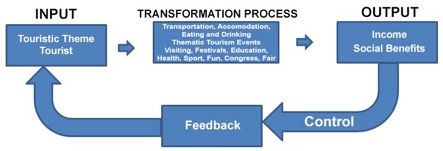- 26/11/2019
- Posted by: admin
- Category: Dr. Sadık BADAK
BADAK, Sadık Ph,D.*
INTRODUCTION
Public or private, country or sector level, “management system” is an infrastructure and is of prime importance for the success of the process. The studies started with F.Taylor and H. Fayol on the principles of scientific management have been progressing since more than a hundred years. According to Fayol, the greatest responsibility in the success of organizations belongs to the “management authority”. Effective and efficient use of management power requires a well-functioning “management system”. The aim of this study is to take a holistic approach for examining the roles of the main actors or stakeholders of the Countries Tourism Management System in becoming a developing country in the tourism sector.
System thought in management, provides a holistic perspective to understand the parts of the whole and their relationship with each other (Trochim et al., 2006: 538). Kenneth Boulding classifies the systems at nine different hierarchical levels (Boulding, 1956: 128-139). According to management theory, “human organizations” take place as a social system in the general environment. Organizations are open systems that take the resources (inputs) around them and process them and convert them into outputs (Koçel, 2014: 320).
A system; it is an organized or complex whole of things or parts that make up a complex or unitary whole, a community or compound. The system concept encompasses an extremely wide range of concepts, such as the mountain system or river systems and the solar system as part of our physical environment. The human body consists of the upper and lower systems as a complex organism, including the skeletal system. It is possible to say that the way the system works depends on another step that follows each step (Johnson et al., 1964: 367-368). The ability to obtain effective results as a result of the operation of the system depends on the success of the processes within the system (Eden, 1992: 800).
1.With System Approach Production of Goods and Services
Optner states that the system consists of five main elements: the inputs of the system, the processing of the inputs, the outputs of the system, the control of the work order, and the feedback mechanism that ensures the survival of the system(Optner, 1960: 9-11). The cycle seen in Figure 1 applies to a single organization as well as to all social systems. As an open system, an enterprise provides inputs such as money, machinery, materials, services and information from its environment and combines these inputs for their purposes and obtains their outputs (product, income).
Figure 1: According to System Approach; Inputs, Transformation Process, Outputs

The tourism industry system works similarly, but the input in the tourism sector are theme and tourist. The production process does not start unless a person or group of people participate in the tourism process. This is the point that separates tourism from other sectors.
INPUT: Touristic Theme, Tourist
PRODUCTION PROCESS: Transportation, Accommodation, Eating and Drinking, Themed Tourism Event (Visiting, Festival, Education, Health, Sports, Entertainment, Congress, Fair etc.)
OUTPUT: Income, Social Benefit

Figure 2: Tourism Service Production System
Tourism Sector is an Open Production System
The production of services in tourism is realized by all actors that make up the sector working as an “open system”. The system includes Internal Actors, Complementary Actors and External Actors (stakeholders). Each of these Actors has a relatively important role in the development of Country Tourism, and each element (actor) in the system needs to be active in these roles. The main purpose of the system is to shape the interaction of various factors and to ensure the quality and efficiency of the process. The “tourism system” whose actors will be examined below should be managed in harmony. If the tourism industry is managed within a “system” county will gain a permanent place in world tourism.
- Tourism Industry Management System In Countries
Countries with theirs rich cultural, historical and natural environment, wants to take its place in the world tourism industry. Countries will progress in the world tourism with its active marketing and active tourism policies with attractive tourism products. The production process in the textile, food, iron, steel and automotive industries requires the cooperation of many institutions and organizations. As other many public and private sector institutions and organizations that provide service production in the tourism industry constitute the “tourism industry management system”. Tourism Industry System and actors to the system are as follows:
TOURISM INDUSTRY MANAGEMENT SYSTEM CENTER ACTORS, AUXILIARY ACTORS AND SUPPORT ACTORS
2.1. Central Actors in Tourism System;
2.1.1. Ministry Of Tourism or Committee ; Committee or Tourism Ministy has a central role in the tourism sector. Provides all the coordination between the State-Government-Sector-Local Governments-Foreign Countries related to the sector, prepares the main strategies, follows the developments and applications, directs the developments, analyzes the results, audits the implementation of the “quality service” principles in the whole sector for the sustainability in tourism and eliminates the problems. It follows tourism education programs before the Ministry of Education.
2.1.2. Tourism sector chambers and professional associations; It conducts studies to increase the competitive advantages of member enterprises and professional members engaged in tourism production and ensures that measures are taken to prevent unfair competition. It plays an active role in the promotion of tourism at home and abroad and contributes to taking measures for the sustainability of the sector.
2.1.3. Accommodation businesses; Fundamental facility is accepted in the tourism service process. According to tourism types, the quality-price balance plays an important role in the sustainability of country tourism in the services offered by the accommodation companies.
2.1.4. Travel agencies; It is “agency management” that started the tourism sector 178 years ago (www.thomascook.co.uk/history) Providing encouraging information to individuals who will participate in tourism and go away from home. They offers alternative budgets and programs.
2.2. Auxiliary Actors in Tourism System;
2.2.1. Airlines and Airports: They provides safe, comfortable and cost-effective transportation of tourists from abroad, provides hygienic environments and timely services in waiting times at airports in and out of the country. It is strategically important for countries which is the main foreign tourism markets, to have intensive flight programs from all target countries.
2.2.2. Railways and it’s stations, Road transport organizations and bus stations:
They enables tourists to buy tourism services during the day by acting with flexible, fast and safe programs in domestic transportation.
2.2.3. Seaways, Sea transport and Ports: It enables tourists to reach the river, straits, lakes and seas or to participate in the tourism activity by cruise, thus realizing a different kind of tourism.
2.2.4. Internet and communication organizations: They ensures that the tourism businesses and tourists coming to the country are in a cost-effective and safe communication with their family and environment during the travel period.
2.2.5. District Governorships (local authorities): Inspects the spatial infrastructures and superstructures of the tourism participants, ensures the environmental order,
2.2.6. Tourism organizations: It organizes the types of tourism (Festival, Sports, Entertainment, Congress, etc.) and informs tourists about tourism activities through agencies or general information. It ensures that participants have a good time in a safe environment during the tourism activity.
2.2.7. Companies providing services to tourism businesses: (Accommodation businesses, restaurants, entertainment centers, tourist shopping places that provide goods and services businesses) Pool, elevator, kitchen installation and maintenance enterprises, hotel room-restaurant lounge supplies, food and consumer goods supplies to accommodation and restaurants businesses, tourism transportation enterprises, tourism-educational enterprises, tourist guides, animation organizations, academia, sectoral press and broadcasting institutions, museums, libraries, theaters and film enterprises, Standard institution, Statistical institution, touristic manufacturers and tourism stores,
2.3. Support Actors in Tourism System;
It consists of the Prime Ministry, the Ministry of Culture, the Ministry of Transport, the Ministry of Agriculture, Forestry and Water, the Ministry of National Education, the Ministry of Health, the Ministry of Foreign Affairs, the Ministry of the Interior, the Ministry of Labor and Labor, the Ministry of Finance and their provincial organizations.
2.3.1. Prime Ministry: Realizes the necessary legal and administrative arrangements for the good functioning of the tourism industry and makes guidance for the correction of disruptions.
2.3.2. Ministry of Culture: takes measures for the protection of historical places that attract tourists, keeping the cultural values alive, managing museums, theaters preserving and exhibiting the works, providing the development of festivals and organizations,
2.3.4. Ministry of Transport: Plans domestic, overseas airline, road and railway infrastructure, performs investments, maintenance and repairs. Takes measures for uninterrupted transportation and regulates transportation rules,
2.3.5. Ministry of Agriculture, Forestry and Water: It supervises the production of clean and safe foods to be consumed in the tourism sector, ensures the planned development of the natural environment for nature and eco tourism, establishes nature parks, supplies drinking and utility water for tourism facilities, measures necessary to prevent the floods from destroying the natural environment. etc.
2.3.6. Ministry of Sports: supports the annual programs of sports federations and contributes to their budgets. Provides the development of domestic and international tourism through regional, national and international sports organizations,
2.3.7. Ministry of Foreign Affairs: contributes to foreign tourism relations and promotions, monitors the visa, entry-exit procedures of tourists,
2.3.8. Ministry of Internal Affairs: provides general security and road safety of tourists day and night at home. Operates with other organizations in the prevention of criminal events.
2.3.9. Ministry of Work and Labor: establishes the rules of work and labor law in the tourism sector and affiliated sectors, provides labor peace,
2.3.10. Ministry of Health: establishes emergency response and treatment infrastructures and protocols concerning tourist health, establishes health tourism legislation and cooperates with other elements of the system in its implementation.
2.3.11. Ministry of National Education: Provides sector training to adults with middle and upper level tourism personnel and guides, educates sectoral trainers, performs building construction-maintenance services, training programs and personnel management of schools.
2.3.12. Community Culture: The success of a country in the tourism sector is closely related to the way society views visitors from different cultures and races. Tourism is becoming more successful and sustainable in societies and countries where guests from different cultures are treated with tolerance.
For world-class and sustainable tourism, there should be strong communication and harmonious cooperation among the system organizations in line with the target. Tourism industry management system is established through continuous communication process between institutions and organizations. Failure of the task of an element in the system weakens the service quality of the whole system. In order to participate in and stay in the world tourism industry, every organization in the tourism industry management system must work effectively and efficiently in line with the target.
Result:
Within the intense economic activities of the state and society, flowing nearly in an abstract river the management system and the natural organizational structure of an industry have not been established by a special law and cannot be seen. But; for efficient and sustainable tourism, this system should be working day and night effectively.
October, 2019
* Consultant, State Committee on Tourism Development in Uzbekistan
SOURCES
- Boulding K. (1956), “General Systems Theory: The Skeleton of Science”, Management Science, Vol. 2, Number 3, April, 128-139.
- Eden, C. (1992), “Strategy Development As a Social Process”, Journal of Management Studies, Volume 29, Issue 6, 799-812.
- Johnson R.A.; Kast F.E.; Rosenzweig J.E. (1964), “Systems Theory and Management”, Management Science, Vol. 10, 367-384.
- Koçel, T. (2014 Business Management, Expanded 15th Edition, Beta Publications, Istanbul.
- Optner, S. L. (1960), Systems Analysis for Business Manegement, Prentice-Hall, Englewood Cliffs, N.J.
- W. M. – Cabrera D. A. – Milstein, B.- Gallagher R. S. ve Leischow, S. J. (2006), “Practical Challanges of System Thinking and Modelling Public Health”, American Journal of Public Health, 96 / 3, 538-546.
- thomascook.co.uk/history
